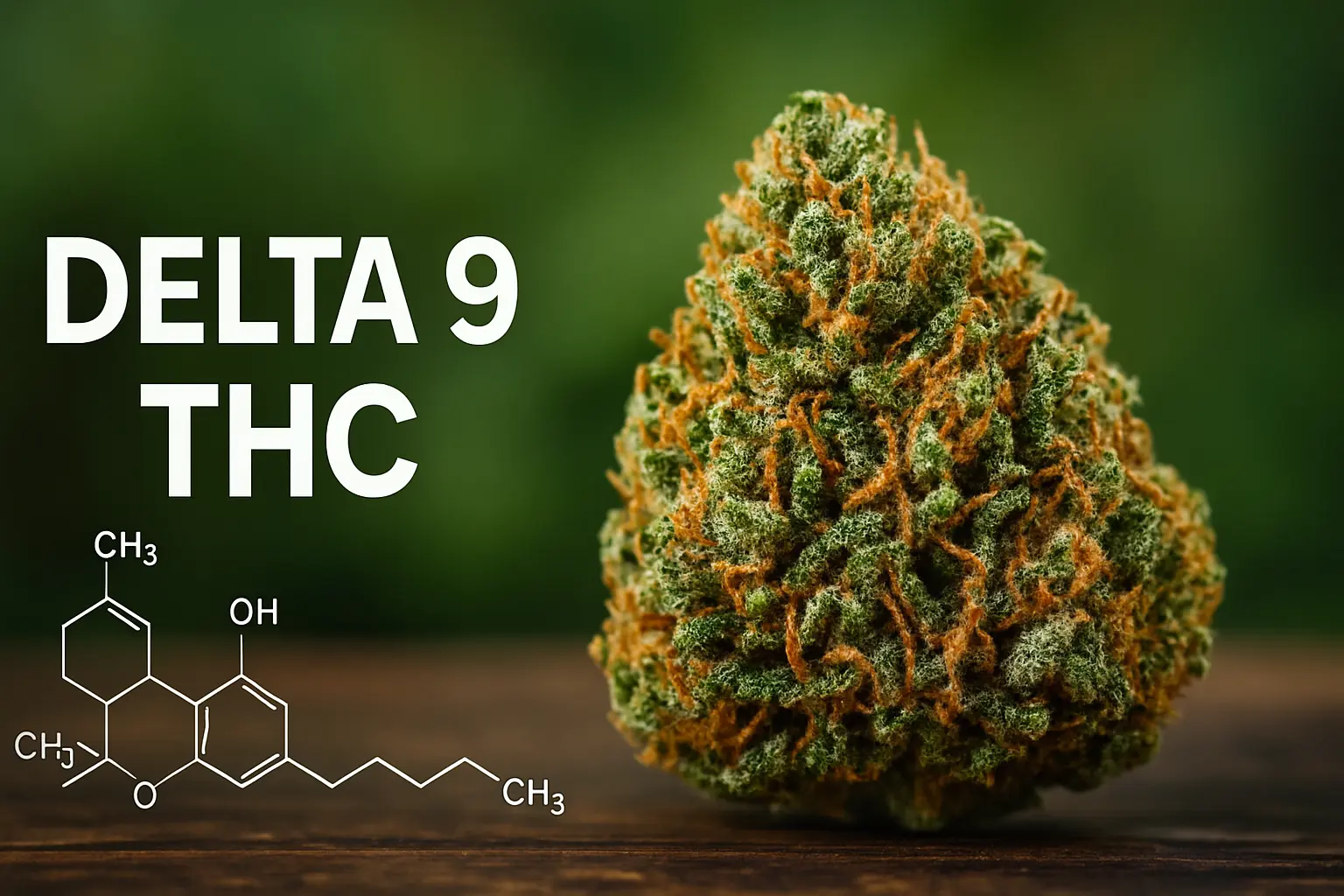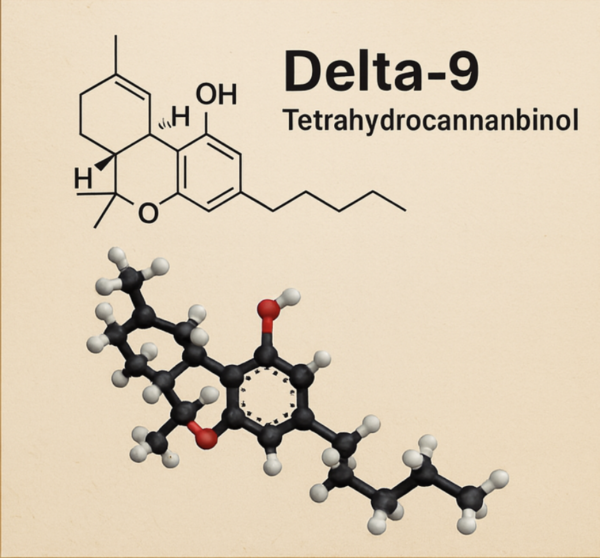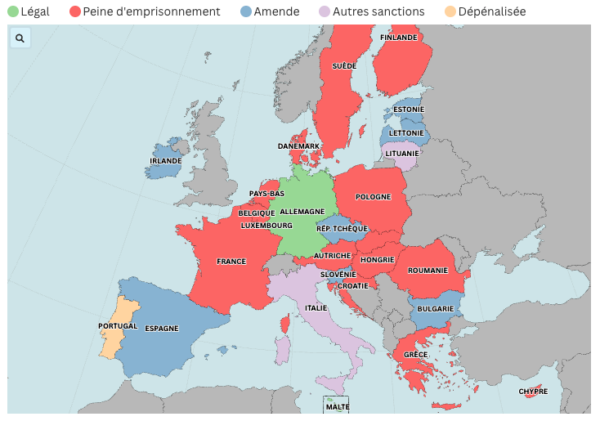Have a question? 06 70 73 89 02
🔞 Not for sale to under 18s
🔥 20% off EVERYTHING on the site with the code: FLASH!!! 🔥 ( except accessories and gummies)
Have a question? 06 70 73 89 02

Delta-9 THC is one of the best-known natural compounds in cannabis. As the main culprit behind the psychoactive effects associated with marijuana, it is widely studied, has a rich history and is at the heart of European legislation governing the plant.
Want to learn more about this cannabinoid like no other? Let's take a look at the definition, role, effects, history and legal status of Delta-9 THC.
Delta-9 tetrahydrocannabinol (Delta-9 THC) is a phytocannabinoid: it is the main natural cannabinoid cannabinoid in cannabis. It is found in all parts of the plant, but is most abundant in the flowers. THC concentration can vary according to plant genetics and cultivation methods. It is often found in concentrations of 5-10%, but can exceed 20% in modern varieties. It is also present in hemp at much lower levels, around 0.2% to 0.3% depending on the country.
The psychotropic effects of Delta-9 THC are due to its interaction with the body's endocannabinoid system (ECS). The ECS is a network of receptors found throughout the body and brain. This interaction modulates the response of certain biochemical processes, producing the effects we're about to see.
Delta-9 THC acts primarily on the CB1 and CB2 receptors of the endocannabinoid system, with which it has a particularly strong affinity. This biological system, and these receptors in particular, are involved in regulating general body and nervous system homeostasis.
CB1 receptors are mainly found in the brain, while CB2 receptors are mainly found in the immune system. Together, they help stabilize and balance the body by regulating several processes. By binding to these receptors, Delta 9 THC modifies the release of several neurotransmitters (dopamine, glutamate, GABA...), influencing in particular :
THC's effects are numerous and fairly well studied. By interacting with the endocannabinoid receptors present in the brain and central nervous system, it creates :
Nevertheless, these effects can vary according to a number of factors: dose, consumption pattern, individual tolerance, personal sensitivity, mood...
Being psychoactive, Delta 9 THC can also cause certain side effects at higher or lower doses, depending on individual tolerance. These include :
It is because of these undesirable effects that Delta-9 THC and cannabis containing it is illegal in mostcountries of the world. Some studies also suggest that Delta-9 THC may have negative effects on brain development in children and adolescents.
While cannabis enjoyed relative popularity in the 19ᵉ century, following Napoleon's conquest of Egypt, Delta-9 THC, the molecule producing the effects enjoyed by hashishers,was not discovered until the 1940s. Indeed, it was at this time that American chemist Roger Adams succeeded in partially isolating the cannabinoid, though he was still unable to determine its exact structure or describe its role.

It wasn't until 1964 that the Delta-9 THC molecule was isolated with certainty and correctly identified.
This discovery was made by Professor Raphael Mechoulam, a world-renowned researcher and undoubtedly one of the scientists who made the greatest contribution to scientific knowledge of the plant. He published the complete chemical structure of delta 9 THC, demonstrating that it is the main psychoactive component of cannabis.
While cannabis has been banned in most Western countries since the first half of the 20th century, it was less than ten years after its discovery that THC was classified as a controlled substance worldwide. In 1971, at the UN Convention on Psychotropic Substances, THC was classified as a Level 1 psychotropic, the most restrictive category: it was considered dangerous and had no medical application.
Fortunately, since the 1970s, legislation concerning THC has eased slightly. Nevertheless, it remains strictly regulated in most European Union member countries.
And while, by 2025, 21 of the 27 countries in the European Union had authorized medical cannabis for research purposes within more or less strict frameworks, only three countries (Malta, Luxembourg and Germany) currently authorize the consumption of cannabis for recreational purposes. Although other countries such as the Netherlands, Spain and Portugal apply more permissive policies, THC remains strictly regulated in the majority of European countries.
In France, after being completely banned, Delta-9 THC has been authorized at a maximum threshold of 0.3% since 2018. The threshold limit of 0.2% or 0.3% is shared by most European Union countries. It legally represents the distinction between hemp, which complies with the THC concentration limit, and cannabis, which is criminally prohibited.
Possession and consumption of cannabis with a Delta-9 THC level above the legal threshold set by the laws of the various European Union countries is liable to prosecution and legal action in most European countries. But each country regulates its own laws in this area: penalties and prosecutions can depend on a number of factors, such as the quantity possessed.
In France, for example, you risk up to a year's imprisonment and a €3,750 fine. A fixed fine of €200 is imposed for possession of less than 100 grams.

Source: European Monitoring Centre for Drugs and Drug Addiction (2025)
For more information on European penalties, we recommend this article dedicated to cannabis legislation in Europe.
For some years now, gummies, or Delta-9 THC candies, have been available in physical CBD shops and online.
If you're wondering how it's possible that they're available when THC is banned, the answer is relatively simple: they comply with current regulations. In fact, they contain only 0.3% Delta-9 THC.
But to ensure that you can feel the effects of the molecule, the manufacturers have resorted to a little sleight of hand by increasing the weight of each candy as much as possible. A candy weighing 10 grams therefore contains 30 mg of THC, equivalent to the THC you'd find in 0.3 g of cannabis with 20% THC.
Apart from gummies and THC edibles, many people in France are looking for an alternative to Delta-9 THC: one that would be legal and less harmful to health. With this in mind, we offer a wide range of CBD products.
Discover our CBD flowers and resins
CBD does not alter perception or consciousness. However, thanks to its interaction with the endocannabinoid system, it can contribute to a feeling of relaxation, general soothing or muscle relaxation, depending on the user.
To meet these expectations, we offer a selection of powerful CBD flowers and resins that comply with current regulations. These products respect the legal THC thresholds (less than 0.3%) and enable you to enjoy the effects of hemp without psychoactivity and in full compliance with French law.